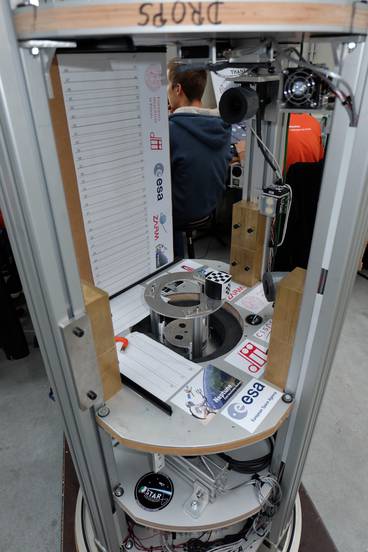Space Tether Automatic Retrieval (STAR)

research area: technology tests
experiment title:
Space Tether Automatic Retrieval (STAR)
experiment acronym: DYT
funding agency:
ESA (Education) / ZARM
grant number:
Drop Your Thesis! - Program
performing organization:
Center for Studies and Activities for Space CISAS "G.Colombo", University of Padova, Italy
prime investigator:
Prof. Alessandro Francesconi
(Gilberto Grassi, Mattia Pezzato, Alessia Gloder, Leonardo Pellegrina, Alvise Rossi)
experiment objective
abstract
STAR (Space Tether Automatic Retrieval) is an experiment carried on by a team of engineering students of the University of Padova. Its main objective is to develop and validate the technology used to build a new concept for a space tether deployer with retrieval capability. The STAR deployer employs a closed-loop feedback to control the deployment with a braking system, whilst the retrieval of a tethered tip mass if performed with an open-loop control. The idea on which this project is based on is to adapt the well-established fixed-spool fishing reel technology to obtain a highly autonomous system suitable for space use. From past space missions it is known that a space tether deployer must have two key characteristics: 1) a very low internal friction (in the order of tens of milli-Newtons for the NASA SEDS missions) and 2) a robust and reliable feedback control. The former point is the reason why the microgravity environment offered by the Drop Your Thesis! facility is necessary to simulate on-orbit conditions, to perform a realistic functional test and eventually to validate the concept. The importance of developing such a technology is remarkable. At present, both Space Agencies and industries are investigating the use of space tethers for various applications (e.g., tethered space tug, electrodynamic drag devices, new docking system concepts for On-Orbit Servicing, atmospheric and space environment research), for which a reliable tether deployer would be a key subsystem. Yet, so far no such devices exist. In this context, the CISAS research centre of the University of Padova aims at developing a new innovative light, low-friction, and reliable deployer with retrieval capability for space tethers. STAR Experiment is complementary to the previously selected FELDs Experiment (Drop Your Thesis! 2014) and it will exploit its experience and results, but focusing on the deployment/retrieval system instead on the electromagnetic docking system.
related publications
- Space Tether Automatic Retrieval (STAR), Drop Your Thesis! 2016 - Final Report. ESA Human Spaceflight and Exploration, Erasmus Experiment Archive
experiment campaigns
experiment year: 2016
number of catapult launches: 5


 "
"